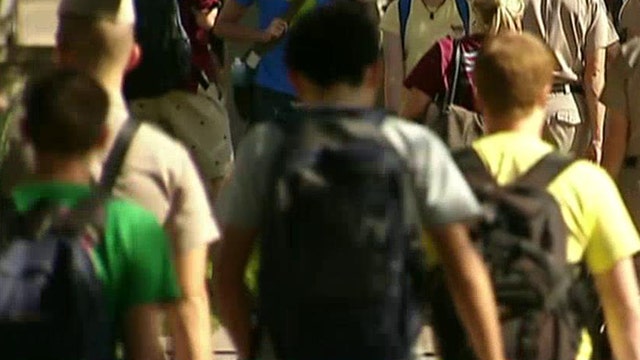Educator says helicopter parenting is ruining a generation
Former Stanford dean explains 'How to Raise an Adult' in new book
Most of us were raised in the absence of baby monitors, formal playdates, and cell phone trackers — and we turned out just fine.
But as photos of missing children began staring at parents from the back of endless milk cartons in the 1980s, such laissez-faire parenting experienced a shift. The trend of hyper-vigilance built momentum — and by 1990, the term “helicopter parent” was coined.
Now, however, this interminable “swoosh-swoosh-swoosh” over virtually every move our kids make extends beyond their safety. It’s become a dangerous epidemic.
Helicopter parents are helping their children escape from the slightest discomfort, preventing them from developing any psychological immunity.
“Well-intentioned parents [are] metabolizing their [children’s] anxiety for them,” said Dr. Wendy Mogel, a clinical psychologist and New York Times best-selling author, in The Atlantic.
This type of parenting limits young people’s experimentation in the real world as parents dictate their child’s life direction. While a helicopter parent may claim this is all about protecting the child, the investigative book “NutureShock” revealed it’s usually about protecting the parent from the “harrowing business of letting go.” And when parents do not let their child fend for himself or herself — the child becomes ill-equipped to persevere in the real world.
Parents who are overly involved in their children’s lives end up getting what they feared most — helpless, entitled, unmotivated young people. “Parents’ inappropriate meddling gives the child the message that nothing is good enough, so many frustrated children quit trying,” said researcher Miguela Rivera in The Hispanic Outlook for Higher Education.
These children often have low self-esteem and minimal confidence in their abilities. They are frequently unable to handle criticism and have trouble dealing with disappointment, mainly because they have not faced it before. Researchers have found that helicopter parenting compromises children’s autonomy, mastery, and personal growth. Young people with over-involved parents also report higher levels of depression and a decreased satisfaction with their lives.
Researchers who have studied adolescents with helicopter parents have found these young people to be more anxious and less socially skilled, and to have poorer coping skills and higher rates of depression. In a recent survey carried out by the American College Health Association, 84 percent of college students felt overwhelmed by responsibilities. Thirteen percent of freshmen reported their parents “frequently intervened on their behalf to help them solve problems they were having at the college,” Margaret K. Nelson noted in her book “Parenting Out of Control: Anxious Parents in Uncertain Times.”
Another recent survey of college freshmen nationwide done by Dr. Neil Montgomery, a psychology professor at Keene State College in Keene, New Hampshire, found that students with helicopter parents were "less open to new ideas and actions and more vulnerable, anxious, and self-conscious." These students were also more likely to be medicated for anxiety or depression.
Once a child graduates from college, many helicopter parents do not relinquish their grasp. They sometimes accompany their child on job interviews — and some even try to negotiate salary and benefits. Helicopter parents have been known to call their child’s human resources managers and bosses to advocate for their child’s advancement and complain if their child is not promoted.
If this sounds like an overstatement, consider this: In a national survey of employers seeking to hire recent college graduates, approximately 25 percent of employers reported hearing from parents that they hire their child.
Researchers agree about the developmental necessity of conflict and failure for children. A child’s critical thinking and problem-solving skills grow more from active and engaged conflict resolution than from observing his parent do so. While helicopter parenting frequently comes with extrinsic rewards — extrinsic motivation provides the child with direction but no internal drive. Parents need to let their child develop intrinsic motivation — an intense, personal desire to work toward a goal of self-fulfillment.
The reality is that the main determinant of a child’s success is grit. According to Dr. Angela Lee Duckworth, a psychologist at the University of Pennsylvania, the most significant predictor of success in kids isn’t social intelligence or IQ. Rather, "it’s about having stamina, sticking with your future." Young people tend to do well when they have such passion and perseverance in pursuit of long-term goals. Researchers have shown that grit, in fact, is more predictive of a child’s success than intelligence.
Parents need to nurture grit by teaching their children that disappointment is acceptable and a good way to strengthen their problem-solving skills.
The good news is that hypervigilant parenting is beginning to evolve. As parents focus on raising a child who is capable of living on his own, they are becoming "free rangers" — parents who do not constantly monitor their children. As author Lenore Skenazy notes in her book, "Free Range Kids," these parents are committed to providing their children "independence training" that will help them learn to fend for themselves, trust their own instincts, and face challenges with confidence rather than fear.
These moms and dads are realizing their most important job is to raise an independent and self-reliant child.
Daniel Riseman, founder of Riseman Educational Consulting in Irvington, New York, has been counseling students and working with families for 16 years on every aspect of the college admissions process, including tutoring students for SAT and ACT tests and selecting schools and majors.
More from LifeZette.com:
Our Favorite Horses Save a Town’s Economy
Parent Alert: Sex Traffickers are Lurking
Apps Make it Easy for Teens to Hide Secrets









































